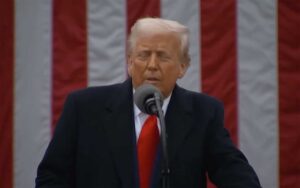‘Everyone is affected’: Solihull reacts to Trump’s 25% tariff on UK car exports

From rugged mountains to urban streets, Land Rovers are a familiar sight across the world. But for decades, many of those iconic vehicles bore the name of Solihull, the West Midlands town that has long been central to the UK’s car manufacturing heritage.
Now, Jaguar Land Rover’s flagship Solihull plant, which employs more than 9,000 workers, finds itself at the centre of a global trade dispute after US President Donald Trump imposed a 25% tariff on UK car exports to the United States.
The announcement — made on what Trump branded “Liberation Day” — forms part of a sweeping round of tariffs hitting 60 countries. For Solihull, the consequences could be far-reaching.
“I’m appalled. It will kill Jaguar Land Rover here in the town,” said Robert Mills, 70, a former automotive consultant. “There could potentially be job losses because JLR export enormously to America. The knock-on effect is going to be enormous.”
The West Midlands was once synonymous with Britain’s industrial might, particularly in automotive manufacturing. Mills recalls a time when the region was criss-crossed with supply chains and component factories.
“When I left school, you couldn’t go around the West Midlands without stumbling across either the supply chain or a manufacturing plant,” he said. Now, he fears the area could suffer a second wave of industrial decline.
Mills believes Trump’s strategy is based on a misplaced confidence that the US can simply re-establish its own car part production.
“Trump may think he can manufacture all the parts again in America. But I’ve seen the closed factories around Detroit. They’re not there. It’s all gone.”
Despite Prime Minister Keir Starmer’s recent efforts to strengthen diplomatic ties — including offering Trump a second state visit — the US has gone ahead with broad tariffs, imposing a blanket 10% duty on all UK goods, but a significantly higher 25% rate specifically on UK-made cars. This contrasts with 20% tariffs on the EU, 34% on China, and a steep 46% on Vietnam.
“Negotiation. Try and reason with an unreasonable man,” Mills offered as advice for the government — though other locals are sceptical that Trump’s position can be swayed.
“I don’t think anyone’s going to be able to persuade him either way,” said Lynda Rhea, 75, who watched Canada’s more defiant stance against the US president unfold in recent weeks.
“The Canadians stood up to him a bit, didn’t they? Is it a good thing to stand up to him? Or is it best to just sit back and wait?”
Her husband, Tony Rhea, 77, who spent his career as an electrical mechanical engineer at JLR, sees the wider picture.
“Everyone is affected. Right down to the cafe where they eat, the people who wash their overalls, and even the people that maintain the robots — that’s all local.”
The sudden nature of the tariffs has added to the anxiety in the town.
“This has come out of the blue,” said Thomas Newman, 86. “If we had five or 10 years then we could have probably planned better, but it’s immediate.”
While he disagrees with the tariffs, Newman does understand the domestic political appeal for the US president.
“I can understand his concern for the American public, but I think it’s going to cause a lot of problems in the stock market and in employment around the world.”
The broader context for Britain’s carmakers is already challenging. In 2024, UK car production fell to its lowest level in 70 years, excluding the pandemic period, due to a combination of weak demand and the global shift toward electric vehicles. Meanwhile, China now commands 76% of the global EV market, with lower-priced vehicles making it increasingly difficult for UK firms to compete.
Newman believes the UK government must do more to support domestic automotive businesses in the face of both international tariffs and stiff global competition.
“We’ve got to give concessions to the UK automotive industry to make it more attractive than the American industry. Chinese electric vehicles can be bought for half the price. We’ve got to be making something that the rest of the world really wants.”
As Solihull grapples with the fallout from Trump’s tariff announcement, the mood is one of concern but not resignation. For a town where the car industry still defines livelihoods, the hope is that clear policy and strong negotiation can protect its economic future — before the engine stops running altogether.




